Diversity, Equity and Inclusion 2023 Progress
MSU is working to advance equity by eliminating race and ethnicity opportunity gaps across all subgroups of students by 2030. Initiatives addressing and supporting this goal are evident in many areas of this report, particularly within the Student Success section. While data in the graphic below reflect racial and ethnic diversity, multiple factors such as disability, first-generation, socioeconomic and veteran status — along with others — are considered when supporting student, staff and faculty success.
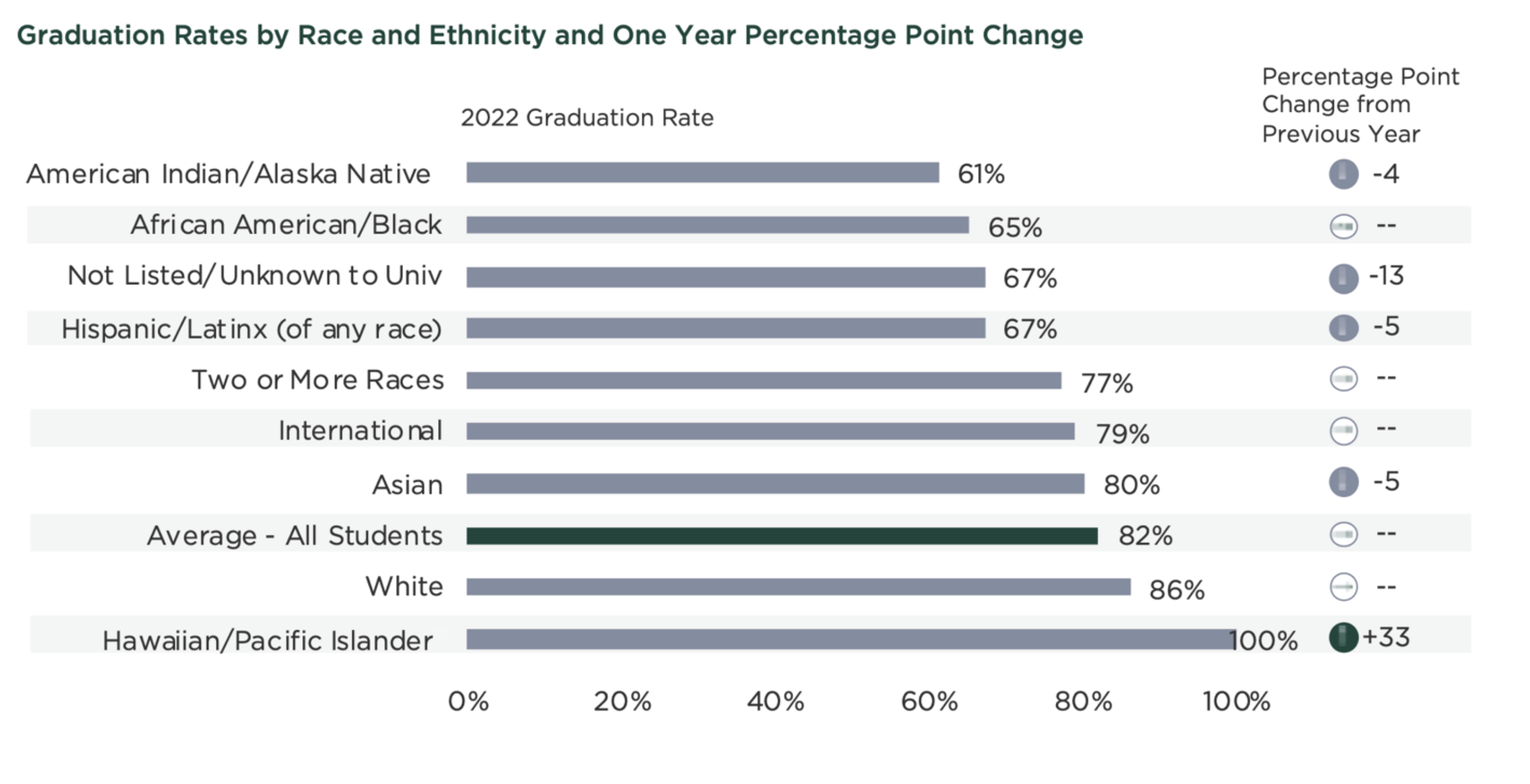
MSU is dedicated to providing opportunity through education and to building the future of Michigan and the nation with the talent and contributions of individuals from all backgrounds and communities.
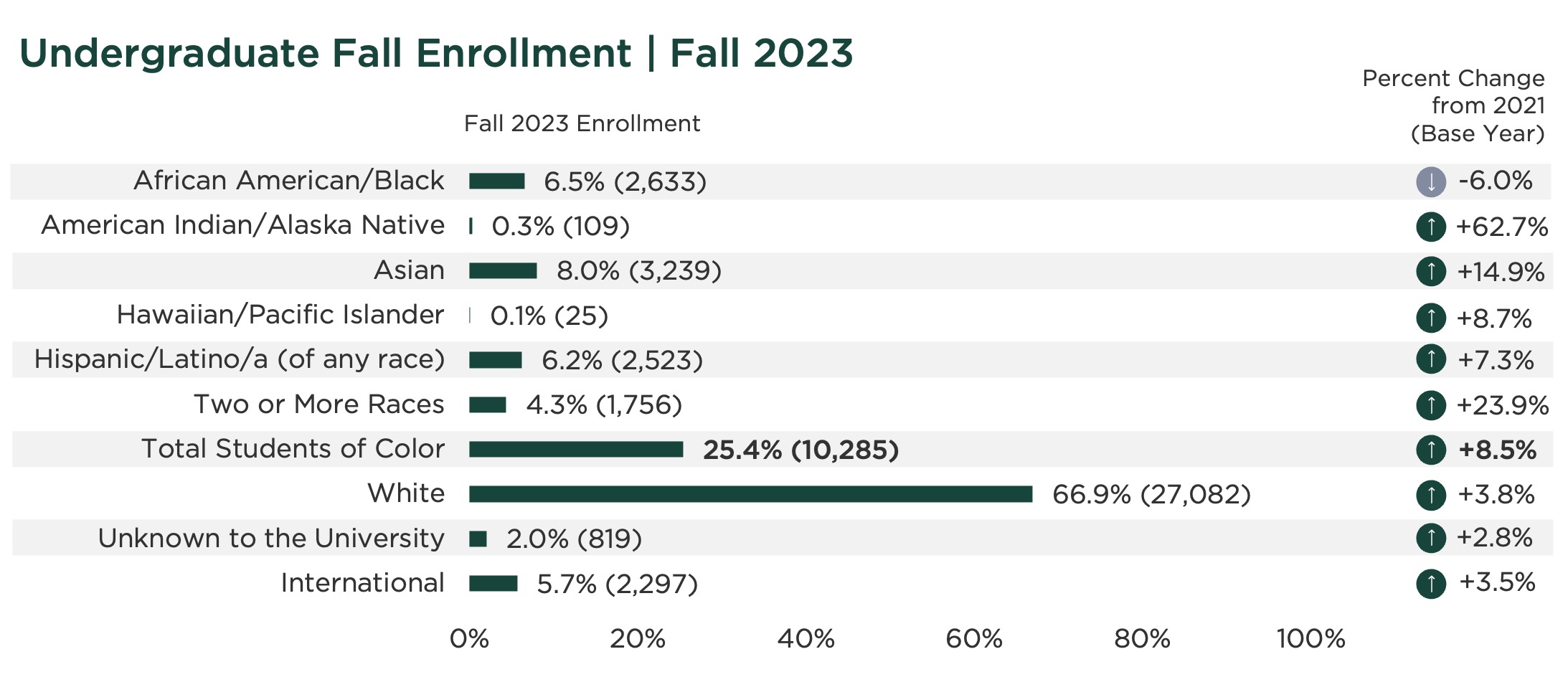
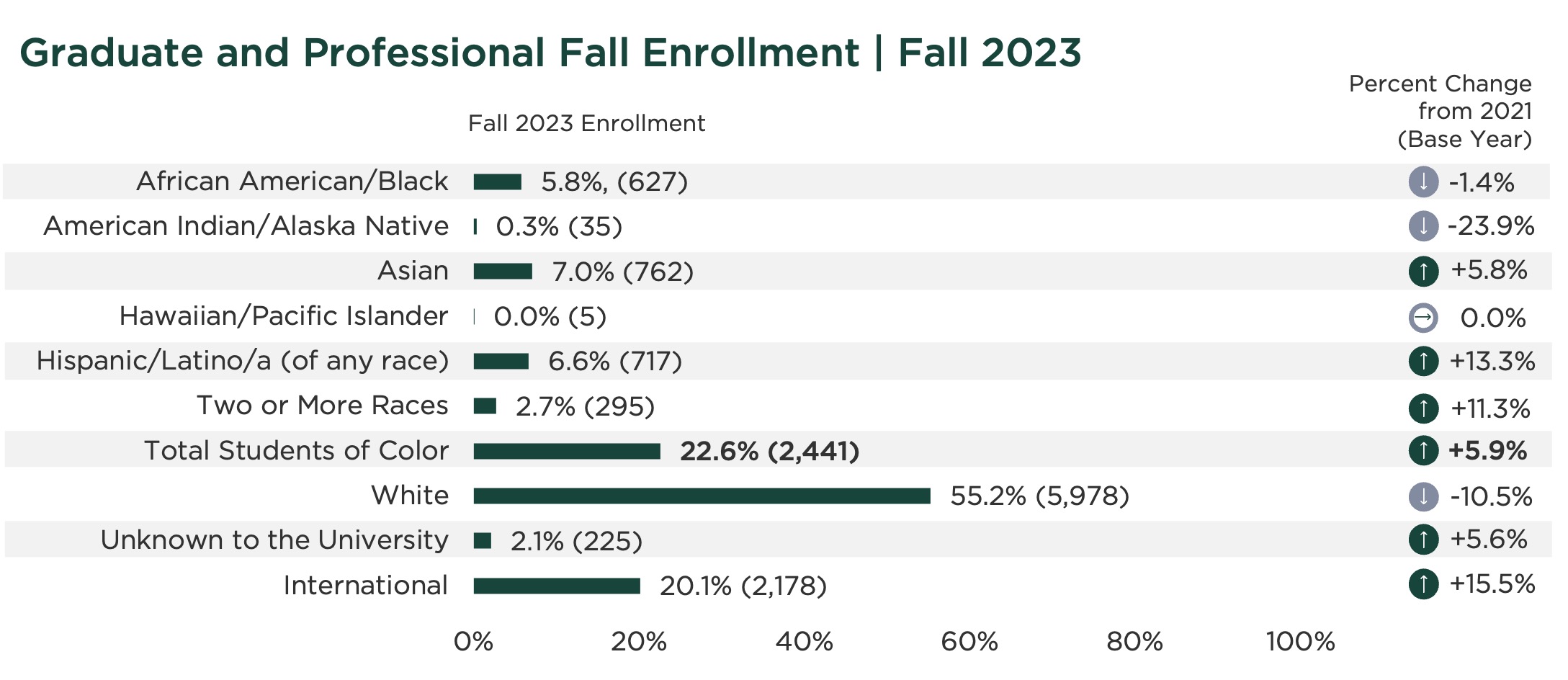
MSU is working to recruit, retain and expand career development for staff with diverse backgrounds.
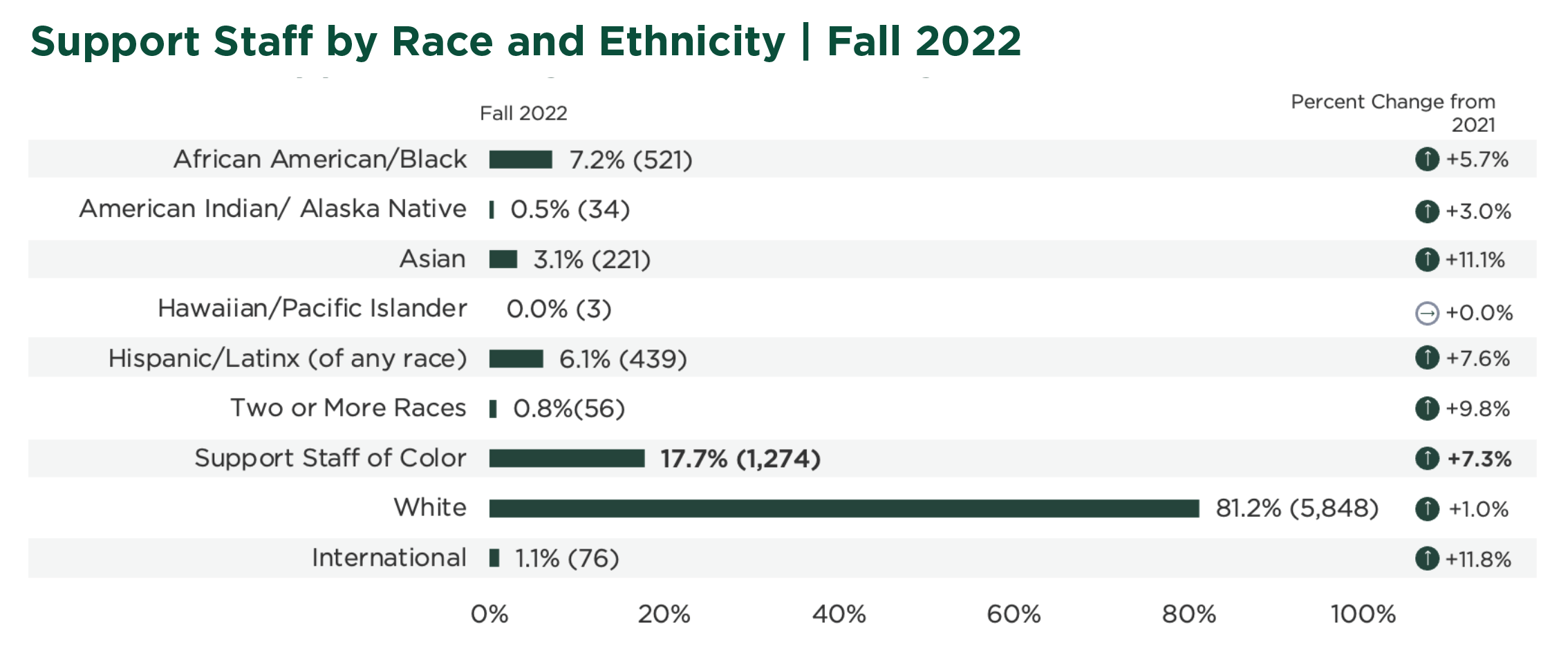
MSU is committed to dramatically increasing MSU academic staff and faculty who make significant contributions to advancing social justice and ethics, ensuring equity, addressing disparities and empowering communities through scholarship and engaged research.
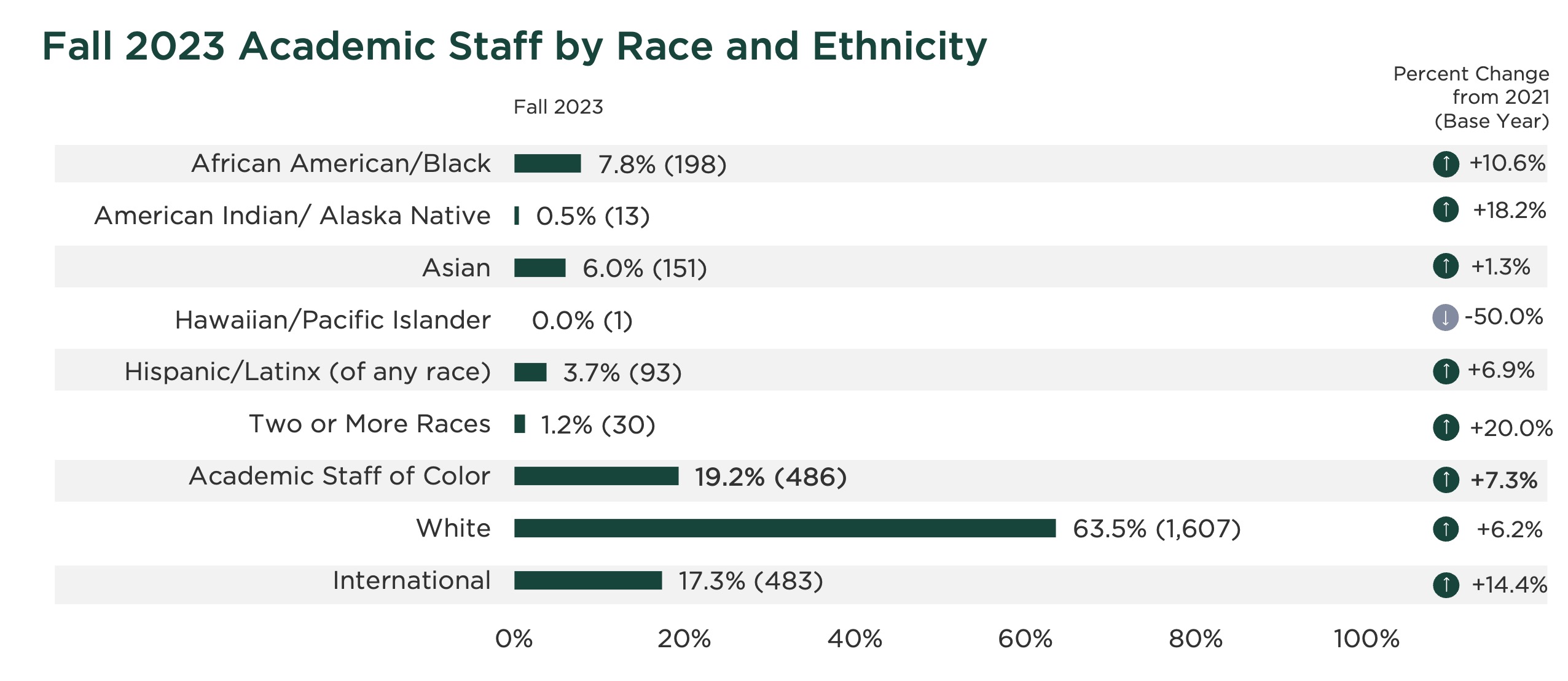
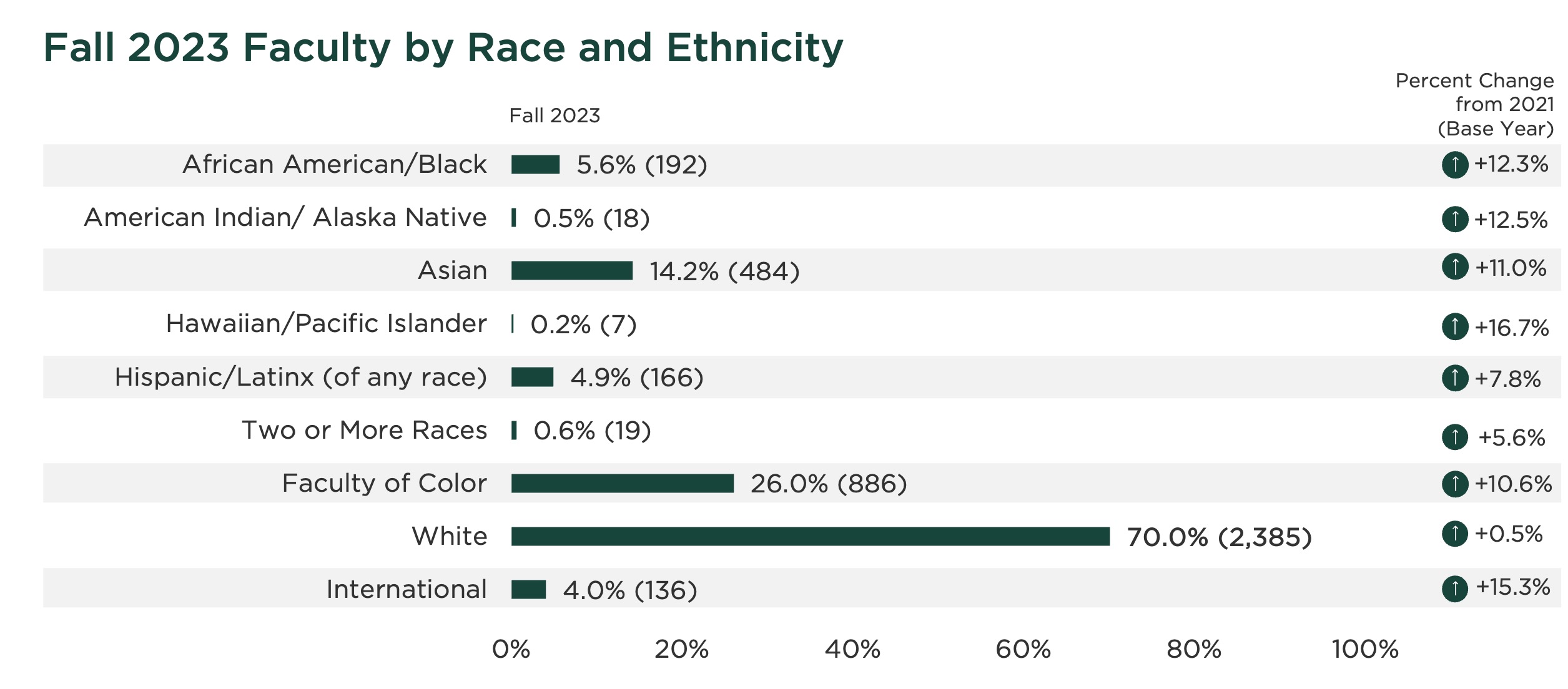
 MSU is improving the all-gender experience. Based on recommendations from a work group consisting of MSU students, staff and faculty, the university is establishing standards regarding the collection and consistent use of name, gender and pronoun data of students, staff, faculty, alums and donors. When fully implemented, users will be able to select from inclusive options across all campus data systems that identify individuals (name, pronoun, honorific, etc.) or collect demographic data (legal sex, gender, etc.). This enables users to list their identities as accurately as possible and gives them the ability to decide how they want to be represented, while maintaining privacy.
MSU is improving the all-gender experience. Based on recommendations from a work group consisting of MSU students, staff and faculty, the university is establishing standards regarding the collection and consistent use of name, gender and pronoun data of students, staff, faculty, alums and donors. When fully implemented, users will be able to select from inclusive options across all campus data systems that identify individuals (name, pronoun, honorific, etc.) or collect demographic data (legal sex, gender, etc.). This enables users to list their identities as accurately as possible and gives them the ability to decide how they want to be represented, while maintaining privacy.
 MSU is investing in inclusive restrooms on campus. As part of the All-Gender Restroom Design Study, MSU has created a locator map of all-gender restrooms available throughout the main East Lansing campus. This tool helps ensure students, employees and visitors can easily find restrooms that support their gender identity. By clicking on a pin on the map, users will see additional information, including the restroom’s location and accessibility. Since the map’s creation, it has been viewed more than 12,000 times.
MSU is investing in inclusive restrooms on campus. As part of the All-Gender Restroom Design Study, MSU has created a locator map of all-gender restrooms available throughout the main East Lansing campus. This tool helps ensure students, employees and visitors can easily find restrooms that support their gender identity. By clicking on a pin on the map, users will see additional information, including the restroom’s location and accessibility. Since the map’s creation, it has been viewed more than 12,000 times.
 MSU is improving student and employee experience with updates to its Religious Observance Policy, following a recommendation by a committee comprising MSU students, staff and faculty. The revisions require faculty and academic staff to make accommodations for students who miss classes for religious days. A religious observance calendar was developed to assist in planning course syllabi. Additionally, MSU recognizes that university holidays do not always align with the diverse religious and multicultural practices of its community members and now provides employees two additional days of personal time to use flexibly each calendar year.
MSU is improving student and employee experience with updates to its Religious Observance Policy, following a recommendation by a committee comprising MSU students, staff and faculty. The revisions require faculty and academic staff to make accommodations for students who miss classes for religious days. A religious observance calendar was developed to assist in planning course syllabi. Additionally, MSU recognizes that university holidays do not always align with the diverse religious and multicultural practices of its community members and now provides employees two additional days of personal time to use flexibly each calendar year.
 MSU is making history by constructing the university's first freestanding multicultural center. Calls for a freestanding multicultural center on MSU’s campus date back to the Civil Rights Movement when protests were sparked by the demands of Black students for increasing racial and ethnic representation on campus. The $38 million stand-alone building, slated to open in fall 2024, will provide a culturally rich and welcoming environment that promotes intellectual curiosity through learning and sharing experiences.
MSU is making history by constructing the university's first freestanding multicultural center. Calls for a freestanding multicultural center on MSU’s campus date back to the Civil Rights Movement when protests were sparked by the demands of Black students for increasing racial and ethnic representation on campus. The $38 million stand-alone building, slated to open in fall 2024, will provide a culturally rich and welcoming environment that promotes intellectual curiosity through learning and sharing experiences.
 MSU has integrated consideration of efforts related to diversity, equity and inclusion in the reappointment, promotion and tenure process. Applicants are encouraged to provide evidence of related activities and accomplishments in the context of research and creative activities, teaching, service, outreach and engagement. The university also worked to integrate consideration of diversity, equity and inclusion-related efforts in the review and promotion processes for all faculty and academic staff.
MSU has integrated consideration of efforts related to diversity, equity and inclusion in the reappointment, promotion and tenure process. Applicants are encouraged to provide evidence of related activities and accomplishments in the context of research and creative activities, teaching, service, outreach and engagement. The university also worked to integrate consideration of diversity, equity and inclusion-related efforts in the review and promotion processes for all faculty and academic staff.